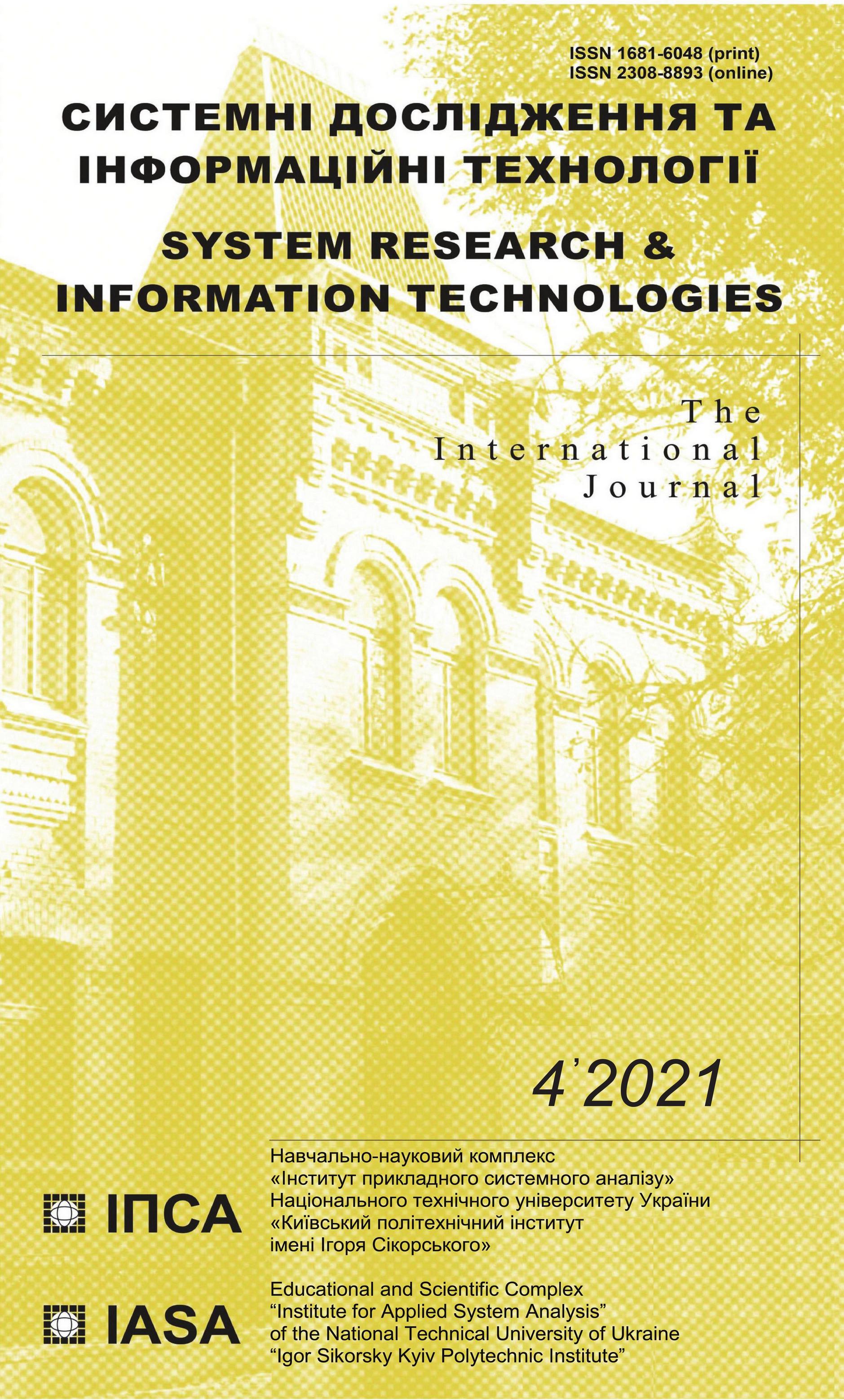Application of optimal set partitioning theory to solving problems of artificial intelligence and pattern recognition
DOI:
https://doi.org/10.20535/SRIT.2308-8893.2021.4.07Keywords:
pattern recognition, artificial intelligence, fuzzy Voronoi diagram, point generators, optimal set partitioning, infinite-dimensional mathematical programmingAbstract
The paper substantiates the possibility of applying the mathematical theory of continuous problems of optimal partitioning of sets of n-dimensional Euclidean space, which belong to the non-classical problems of infinite-dimensional mathematical programming, to the solution of problems of artificial intelligence and pattern recognition. The problems of pattern recognition both in conditions of certainty and in conditions of uncertainty are formulated. A particular attention is paid to the application of methods of the theory of optimal partitioning for the construction of fuzzy Voronoi diagrams. Examples of constructing fuzzy Voronoi diagrams with the optimal placement of generating points are given.
References
E.M. Kiseleva, Mathematical Methods for Optimal Set Partitioning and Their Applications [in rus]. Dn-sk: DGU, 1982, 108 p.
E.M. Kiseleva, “The Emergence and Formation of the Theory of Optimal Set Partitioning for Sets of the n-Dimensional Euclidean Space. Theory and Application”, Journal of Automation and Information Sciences, no. 50(9), pp. 1–24, 2018.
E.M. Kiseleva and N.Z. Shor, Continuous problems of optimal partitioning of sets: theory, algorithms, applications [in rus]. Kyiv: Naukova Dumka, 2005, 564 p.
E.M. Kiseleva, The formation and development of the theory of optimal set partitioning. Theoretical and practical applications: monograph [in ukr]. Dnipro: Lira, 2018, 532 p.
V.I. Vasiliev, Recognising Systems: A Handbook [in rus]. Kyiv: Naukova Dumka, 1983, 422 p.
B.N. Bublik and N.F. Kirichenko, Fundamentals of control theory [in rus]. Kyiv: Vishcha shkola, 1975, 327 p.
E.M. Kiseleva, L.S. Koriashkina, and S.A. Us, Optimal Set Partitioning Theory In Pattern Recognition, Analysis And Identification Problems [in rus]. Dnipro: NGU, 2015, 270 p.
Fuzzy Sets In Control Models And Artificial Intelligence [in rus]; ed. by D.A. Pospelov. Moskva: Nauka, 1986, 312 p.
E.M. Kiseleva, L.L. Hart, O.M. Prytomanova, and N.V. Baleiko, Fuzzy problems of optimal partitioning of sets: theoretical foundations, algorithms, applications: monograph [in ukr]. Dnipro: Lyra, 2020, 400 p.
E.M. Kiseleva and L.S. Koriashkina, “Theory of continuous optimal set partitioning problems as a universal mathematical formalism for constructing Voronoi diagrams and their generalizations I. Theoretical foundations”, Cybernetics and Systems Analysis, no. 51(3), pp.325–335, 2015.
E.M. Kiseleva and L.S. Koriashkina, “Theory of continuous optimal set partitioning problems as a universal mathematical formalism for constructing voronoi diagrams and their generalizations. II. Algorithms for constructing Voronoi diagrams based on the theory of optimal set partitioning”, Cybernetics and Systems Analysis, no. 51(4), pp. 489–499, 2015.
E.M. Kiseleva, O.M. Prytomanova, and L.L. Hart, “Algorithm for constructing voronoi diagrams with optimal placement of generator points based on optimal set partitioning theory”, Journal of Automation and Information Science, no. 52(3), pp. 1–12, 2020.
E.M. Kiseleva, L.L. Hart, O.M. Prytomanova, and S.V. Zhuravel, “Construction of a generalized Voronoi diagram with optimal placement of generator points based on the theory of optimal set partitioning”, Matematychni Studii, no. 53(1), pp. 109–112, 2020.
E. Kiseleva, O. Prytomanova, and V. Padalko, “An algorithm for constructing additive and multiplicative Voronoi diagrams under uncertainty”, in Babichev S., Lytvynenko V., Wójcik W., Vyshemyrskaya S. (eds) Lecture Notes in Computational Intelligence and Decision Making, Springer: Cham, ISDMCI 2020, vol. 1246, pp. 714–727, 2020.
E.M. Kiseleva, O.M. Prytomanova, and S.V. Zhuravel, “Algorithm for Solving a Continuous Problem of Optimal Partitioning with Neurolinguistic Identification of Functions in Target Functional”, Journal of Automation and Information Science, no. 50(3), pp. 1–20, 2018.
N.Z. Shor, Nondifferentiable optimization and polynomial problems. Boston, Dordrecht, London: Kluwer Acad. Publ., 1998, 412 p.
L.A. Zadeh, “Fuzzy sets”, Information and Control, no. 8, pp. 338–353, 1965.
V.G. Padalko, “Structure and main directions of development of the mathematical theory of optimal set partitioning [in ukr]”, Problems of applied mathematics and mathematical modelling, vol. 21, pp. 161–180, 2021.

